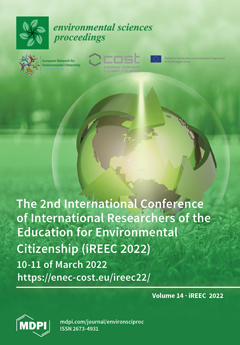This work deals with the proposal of a methodology for the survey of citizens’ attitudes in relation to their citizenship in light of the economic dimensions of environmental citizenship (EC). This is especially beneficial for university students, doctoral students and young researchers. The design allows for quantitative data processing. Thus, closed questions are dominant. However, open questions may serve as an incentive to set up further research. Demographic questions (age, education, gender, residence, social status, etc.) are used to perform a contingency analysis. Relevant hypotheses will be tested with suitable statistical methods, depending on the method of sampling (random vs. intentional). How the respondents perceived the status of being a citizen shall be investigated using the semantic differential method—a pair of opposite adjectives on the value scale. The proposed pairs are: actual–outdated, active–passive, easy–hard, significant–meaningless, normal–subnormal, attractive–repulsive. The concepts of a global citizen [
1,
2] and “Environmental Citizen” defined by ENEC [
3] point to the citizen as a mediator of change from the local to global level. Thus follows, especially within EU countries, the verification of whether citizenship is perceived as more “regional” (country affiliation) or more as “European”. This attitude can be further related to attitudes towards EU institutions. Based on the above definitions, we propose determining the involvement of respondents in civic activities (social and environmental level, etc.). The frequency of involvement is examined at set levels from “none” (through sporadic) to “permanent”. Barry [
4] criticized firms and public bodies for adopting the language of EC as being motivated either by compliance with corporate environmental reporting or as evidence of a commitment to the concept of CSR. Here, encouraging employees to be environmental citizens is simply an integral part of corporate systems. Barry describes such EC as a part-time occupation—something one engages in during working hours [
5]. Thus, we include a question focused on the transfer of habits and standards of behavior from the organization to civic life (the answers use a Likert-type scale). The potential transfer of habits can be at the following levels: ethical principles, responsibility for the environment, the ways of communicating with people, and the relationship with local communities. Moreover, the cultural environment specifics could be included. The next part focuses on which entities play an important role in environmental responsibility: the state (institutions); EU institutions; businesses; individuals (their civic activities); individuals (their consumer decisions). Considering the last two items, the awareness of citizenship is surveyed with regard to: having rights, having responsibility, and having an affiliation with society. From the consumer’s position, consumer rights, responsibility (for purchasing decisions), and belonging to a group of consumers are also examined. The respondents assess the extent to which their purchasing behavior is affected by: global trends, their own discretion, personalities or institutions, media, and local influences.
Full article



